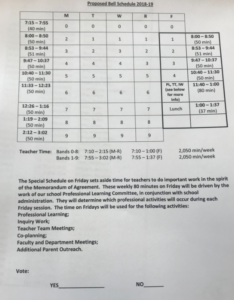
On Monday, April 30, Townsend Harris teachers participated in a School Based Option vote regarding the possible implementation of a block schedule for the 2018-2019 school year. Though the Department of Education still needs to approve the schedule, the plan passed among teachers with a vote of 55 to 6. The proposed schedule includes each class meeting only four times a week, an earlier start, and a shortened day on Fridays.
Created by language teacher and Townsend Harris alum Christopher Amanna, the plan entails a form of scheduling familiar to past generations of THHS students and staff, as a block schedule was last in place during the 2013-2014 school year. The proposal surpassed the minimum requirement of a 55% agreement and received 90% of votes in favor. An image of the schedule is presented below. This is the schedule that teachers voted on, though there still may be changes before September.

After hearing complaints about students feeling overwhelmed, Principal Brian Condon feels that this proposed schedule could solve that issue by alleviating students’ notorious workload. Since classes would meet only four times a week, teachers would only be able to assign homework and tests on those days, which limits the amount that accumulates throughout the week. However, according to Principal Condon, if there were to be issues with the new schedule, “we would be able to tweak it for the year after.”
With the shortened days on Fridays, there would be time for faculty meetings, which would allow teachers to come together weekly before the school day in order to share ideas and learn from each other ― something that the current schedule does not make time for. Principal Condon feels that this addition could facilitate better organization and necessary communication between teachers.
“I think we have a long record that this schedule works and that it fits our school’s mission well,” said UFT chapter leader and history teacher Franco Scardino, who worked alongside Principal Brian Condon and the assistant principals toward developing an approvable schedule. “Having an additional ten or twelve minutes in a period just allows for more meaningful activities to occur.” He continued, “While students will have to come in a little earlier on Monday through Friday, the tradeoff of their day ending at 11:30 every Friday really creates a nice block of time for kids to do stuff, whether it is personal or academic.”
In agreement with Mr. Scardino’s points, social studies teacher Christopher Hackney expressed his optimism about the change, “This schedule would allow me to adjust my lessons to do more creative and in-depth stuff.” According to him, it will not cause major problems.
Since the amount of classroom time per week in the new schedule does not deviate from that of the nine-band schedule, teachers in support of the schedule have expressed that they aren’t worried about adjusting their lesson plans accordingly. For instance, Spanish teacher Christian Castillo explained that his lesson plans will adapt accordingly to fit the longer bands.
However, Mr. Amanna’s proposition has still met some opposition from students due to the earlier start to zero band classes. “I don’t think we should extend zero band time because we do get a lot done already within the time we have,” junior Sharona Priyev said. “Zero band is the longest band in our current schedule. We have enough trouble getting to school by 7:30; making it earlier isn’t going to help. Although we would have shorter school days on Fridays, I prefer the schedule we have now. The new schedule seems too tiring to me.”
Ms. Fee clarified, “We are removing biology and chemistry labs out of zero band so those labs will be during lunch or somehow embedded into the school day. The physics labs will be the only ones meeting zero band and that is mostly because they need space in the hallway….As for [zero band] physical education classes, they will be only for seniors since they meet in the Fitzgerald Gym.”
The implementation of the block schedule into the next school year presents potential conflicts regarding labs and physical education classes. However, faculty is working with the administration to limit the number of students who have zero band classes. In order to do this, the school day would have an earlier start and only one science lab and two physical education classes at the Fitzgerald Gym in Queens College would run during that time. “This [change] was something that students wanted and parents wanted,” said Mr. Scardino.
Some students also feel that knowing about this new schedule would have changed their choices for next year’s electives. “I currently wake up at 5am for zero band and with this new schedule, I would have to wake up even earlier. Had I known about this possible change, I might have chosen different gym electives for next year,” says junior Sabina Prochowski. Junior Ralph Rodriguez also feels as though this possible new schedule “may limit the amount of free bands that seniors typically have and look forward to.” Others feel that this change would have not made a difference in their decisions. “I chose classes I thought I needed to take and that wouldn’t change with a new schedule,” said Sharona.
Despite this schedule being proposed and voted on, Mr. Scardino emphasizes that it is not definite. The proposal has yet to be presented to the DOE and details are subject to change. Even if issues do arise with the new schedule, Mr. Scardino is “confident that [administration] will identify the things that need to be corrected and they will immediately be fixed.”


























